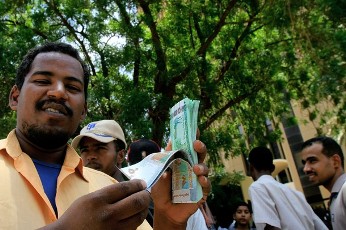Oil deal news already improving currency, gold rates in Sudan
August 9, 2012 (KHARTOUM) – The Sudanese pound is slowly beginning to recover from months of sharp declines in value against the US dollar following news of a deal reached to resume exporting South Sudan’s oil.

Traders interviewed by Sudan Tribune attributed the improvement to the oil deal made between Sudan and South Sudan, adding that black market is incurring great losses as a result.
However, they pointed out that the power of purchasing dollars remains weak due to what they described as the disequilibrium between supply and demand.
Sudanese authorities were forced to devalue the pound on several occasions as the gap between the official and the black market rate widened significantly after the country lost the main source of hard currency reserves when South Sudan seceded in July last year taking with it three quarters of Sudan’s oil production.
The decrease in the dollar’s price in turn affected the local gold market where, according to one trader, the price of the gram went down from 262 SDG to 250 SDG pounds.
However, the two countries announced on Friday, 3 August, that they reached a deal to resume exporting South Sudan’s oil via Sudan at an average rate of $10 per barrel following a seven month hiatus due to disagreements on fair transit fees. The deal also involves Juba paying Khartoum $3.028 billion in transitional financial assistance over the three year period of the agreement.
Sudan’s state minister for finance, Abdel Rahman Dirar, said in a press conference he held in the capital Khartoum on Thursday that the oil deal is “meaningful”.
Dirar added that the deal is expected to increase state revenues of hard currency revenues and hence improve the rate of the pound. He said it is also expected to cover the budget gap and contribute to extricating the economy from stagnation.
The minister admitted that his country was ill-prepared for the economic situation created by South Sudan’s secession but he denied that the economy was in a state of crisis saying that the current problems are not fundamental and could be surmounted with little measures.
According to Dirar, these measures could now bear fruit in a shorter timeframe due to the new deal with Juba.
Sudan announced in June that it was cutting fuel subsidies and downsizing government beurucracey as part of an austerity plan to make up for a budget gap of 2.4 billion USD.
The plan, which worsened the already deteriorating living standards of average Sudanese, led to the outbreak of several demonstrations to which the authorities responded with excessive force, arresting hundreds of activists and killing at least 8 demonstrators in the western region of Darfur.
(ST)
